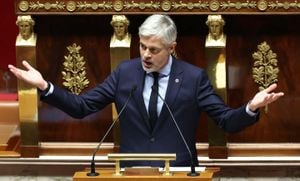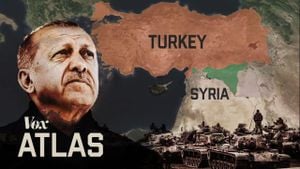Trump's bold economic threats have kicked off heated discussions surrounding the future of currency among BRICS nations.
Recently, President-elect Donald Trump has taken to social media to put forth stark warning signals to the proposed BRICS currency, which is being discussed among member nations including China, Russia, Brazil, India, and South Africa. His claim rests on imposing staggering 100% tariffs on these nations if they attempt to create and utilize this new currency meant to weaken the influence of the US dollar globally.
On Truth Social, Trump stated, "The idea of the BRICS countries moving away from the Dollar is OVER." He demanded commitments from those nations, asserting, "They will face 100% Tariffs and should expect to say goodbye to selling onto the wonderful US economy." This ultimatum paints the situation as Trump sees it: ensuring the US dollar stays at the forefront of international finance.
The BRICS coalition, originally founded as BRIC back in 2009, encompasses some of the world's largest developing economies. Discussions are amplifying about reducing their reliance on the dollar, something Brazilian President Luiz Ignacio Lula da Silva has been vocal about, advocating for the establishment of a common currency across South America. During the recent BRICS summit, he made passionate calls for member nations to experiment with new currency constructs. Unfortunately for Lula, many of his compatriots largely dismissed this proposition.
Notably, experts are skeptical about the feasibility of this new BRICS currency. Harvard economist Jeffrey Frankel highlighted the major barriers BRICS faces amid existing political disunity and economic integration challenges. He remarked, "There isn’t the ghost of a chance... for the BRICS countries to create a common currency," emphasizing the internal disparities within this diverse coalition.
Trump’s fervent approach coincides with rising concerns globally about the economic supremacy of the US dollar. Experts believe nations involved are striving to bolster national currencies for international trading purposes. Kremlin spokesperson Dmitry Peskov echoed this sentiment, stating, "If the United States uses force to mandate the use of the dollar, it will likely accelerate the shift toward national currencies" within BRICS.
This sentiment reflects the challenges the US faces on the global stage as countries explore alternatives to the dollar amid increasingly complex geopolitical and economic landscapes. While BRICS has not yet reached serious intentions to establish their own currency, the pressure to do so gains momentum as distrust with Western currencies escalates, particularly following the recent sanctions against Russia.
Russian president Vladimir Putin continuously emphasizes the importance of shifting toward local currencies for trade among BRICS members, insisting it's key for economic independence. Yet, Putin also suggests it's premature to rush discussions of forming any unified currency for BRICS. The challenge persists as internal discord within the group stands as another hurdle to achieving this lofty goal.
Experts speculate whether Trump fully grasps the underlying dynamics at play within BRICS concerning currency discussions. Alexey Maslov, who studies socioeconomic political dynamics, noted, "The recent BRICS forum highlighted many challenges... no one is seriously striving for joint currency" as one might expect.
Maslov's insights capture the essence of why Trump's tariffs might be more symbolic than substantive. He expressed concern over the potential fallout of Trump's threats, particularly how they might restrict the US's trading partnerships globally. "If Trump were to follow through, much of Asia and Eurasia would fall under these measures," he warned. This statement raises difficult questions about how those nations could operate economically without significant US trading partners.
Alternative financial mechanisms, rather than outright currency unification, seem to be what many BRICS countries are exploring. China's push for digital currency exemplifies this global shift away from the dollar. Amid these discussions, Russia is also investigating options from cryptocurrencies to gold-backed digital frameworks, all of which suggest they're striving for increased financial autonomy.
With BRICS nations evaluating their economic futures, Trump's declaration frames this conflict prickly with geopolitical tensions. Rather than solidify the dollar’s position, experts view Trump's threats as potentially backfiring against US interests, undermining the credibility of US economic leadership.
While making political noise, the reality remains complex for BRICS—a coalition whose members enjoy some solidarity against Western hegemony but lack the unity or structure to challenge the dollar’s dominance effectively. Discussions are complex and layered, creating a maze of international economics where every decision bears weight.
Consequently, the clash over currency between the US and BRICS nations reveals more about political positioning than ground-level realities within these nations. It exposes another layer of global geopolitics—a world ever-evolving as countries actively plan how to engage with one another economically.
Trump’s tariffs against BRICS may end up more as campaign bluster than actionable policy, limited by the realities of the political and economic systems at play. Hence, as BRICS countries advance their dialogues over currency, the question remains: will they truly move toward something more foundational, or will these ventures remain mere concepts?
Experts observe, regardless of the outcomes, BRICS highlights the shifting power dynamics on the world stage and how alliances like these seek alternatives to traditional financial structures, especially amid Trump's tumultuous economic rhetoric.



